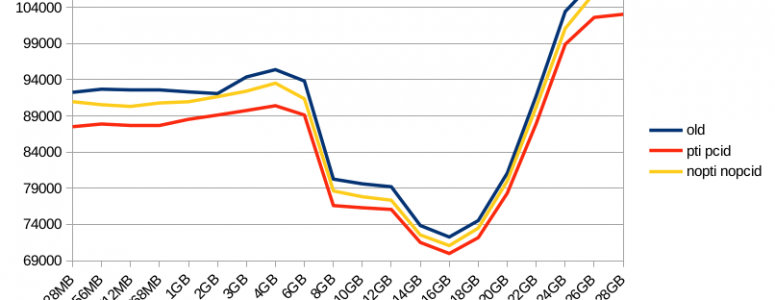
PostgreSQL Performance Meltdown?
Overview
Test setup
Test details
- Old kernel version: 3.10.0-514.el7.x86_64
- New kernel version, as-is: 3.10.0-693.11.6.el7.x86_64-pti-pcid
- New kernel, with nopcid: 3.10.0-693.11.6.el7.x86_64-pti-nopcid
- New kernel, with nopti: 3.10.0-693.11.6.el7.x86_64-nopti-pcid
- New kernel, with nopti nopcid: 3.10.0-693.11.6.el7.x86_64-nopti-nopcid
Results
|
Alias
|
TPS (1GB)
|
TPS (8GB)
|
TPS (28GB)
|
|
old
|
92995
|
80554
|
107144
|
|
pti pcid
|
88394 (-4.9%)
|
77586 (-3.7%)
|
102839 (-4.0%)
|
|
pti nopcid
|
83216 (-10.5%)
|
74947 (-7.0%)
|
98653 (-7.9%)
|
|
nopti pcid
|
90772 (-2.4%)
|
79120 (-1.8%)
|
105726 (-1.3%)
|
|
nopti nopcid
|
91387 (-1.7%)
|
78856 (-2.1%)
|
105593 (-1.4%)
|
There are no general directions on whether to disable PTI, after all, its goal is to close HW-based bug. In cases, when server is dedicated to the database alone and it is a physical machine (not VM or container), it seems fine to use nopti parameter and get a better performance.
Here’s a graph, that shows TPS for the old kernel, new (PTI-enabled) one and new kernel with PTI and PCID features disabled:







